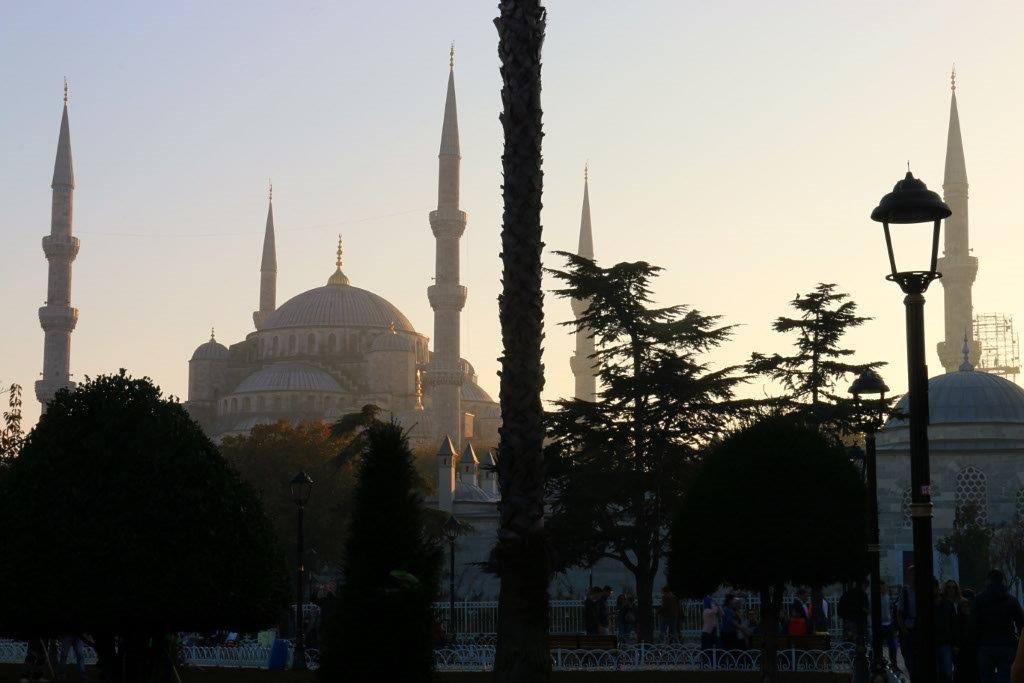
22 Sep 14: Doner-cadia (Turkey)
Hamzabeyli, Bulgaria to Istanbul, Turkey (7 – 20 Nov)
Total miles cycled: 2,440 (3,927km)
Thigh status: Elephant seal
For all wannabe crooks, swindlers and general ne’er-do-wells out there, I have a word of advice: become a tour cyclist. Everyone trusts you and welcomes you into their lives, without question. You’re a source of unending intrigue, confusion and concern. Why on earth are you on a bike? Don’t you have a car? Do you need some kind of help? Money, lodgings, a few extra marbles? As criminal ruses go, it couldn’t be more perfect.
One of the best places to try this is probably Turkey, where warmth and hospitality know no bounds. Getting there is the hard part, however. The border guards are perhaps not quite so credulous when it comes to believing you’re exactly as you appear – i.e. a shabby itinerant with sensational thighs – and even seem to verge on the suspicious at times. My personal bid to gain entry involves five passport checks, a thorough once-over in the visa section and a portly old curmudgeon who objects strongly to a snatched photo in the queue. By the end I’m feeling thoroughly nefarious, and only wish I had the criminal credentials to justify the whole endeavour.
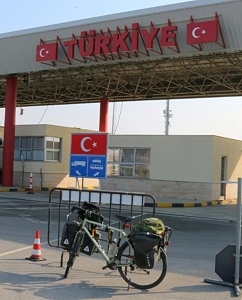
Maud posing at the EU border. The guards don’t seem to appreciate the moment, however, and ban any more pics.
When I finally reach Turkish soil, however, I realise I’ve had it easy. Stretching for miles in front of me is a vast line of bumper-to-bumper lorries, all patiently awaiting their chance to enter the EU. Behind them, the 30km barbed wire fence constructed by the Bulgarians is clearly visible, snaking insidiously through the woodland. With Western Europe placing the bulk of the migrant security burden on its southern allies, neither country is taking any chances. The message to refugees could not be clearer: keep out; get lost; go home.
Cycling alongside the stationary 5km tailback, I feel a mixture of deep relief, guilt and pity. Thank god I have the good fortune and privilege to be swimming against the tide, I think (a kind of cycling salmon, if you will). Thank god I was born where and when I was. Thank god I am free: politically, economically, socially, emotionally. Thank god.
Once inside, I warm to Turkey almost immediately. Hypnotic Islamic music wafts from the border station, while truckies wave cheerily and invite me for tea. The roads are far better than Bulgaria, too. I continue along the highway for a few kilometres before turning onto a smaller country track. Cars are soon replaced by tractors, while men in flat caps idle serenely outside cafés. Coiling around me as I ride is a strong scent of manure, interspersed by an occasional waft of something pungently alcoholic.
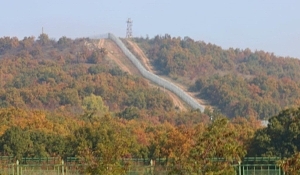
The 30km barbed wire fence between Bulgaria and Turkey to keep refugees out of Europe.
It’s late afternoon by the time I pull up in Süloğlu, the biggest village on my route. Unfortunately this still isn’t very big. Populated by just 4,500 people, there’s no hotel or restaurant to be seen; not even a sizeable shop. In the end I go into the least grotty place I can find, a pharmacy, and ask for help. It’s a good move, as it turns out. ‘Did someone send you here?’ the pleasant man behind the counter asks. ‘I’m the only English-speaker in town.’
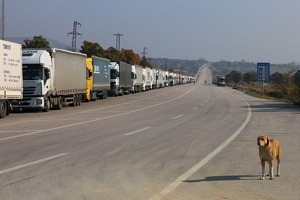
Five-kilometre lorry queue on Turkish side of border at Hamzabeyli. And a hound.
I am advised to go to the police station and – channelling my 1960s bummler idol Dervla Murphy, who spent much of her time exploiting the hospitality of local gendarmeries – I duly oblige. Once there, they clearly have no idea what to do about me. Two hapless young chaps mutter and look mildly alarmed, before fetching their superior, who proceeds to fetch his. Finally, a dynamic-looking fellow appears, who leads me down to the basement. It’s warm and clean, with invitingly resplendent sofas (see pic), and I’m told I’m very welcome to stay there. Dervla eat your heart out!
The police turn out to be perfect hosts. I am given a heater and access to the tuck shop, and even bought dinner: my first authentic Turkish doner, complete with salad, yoghurt and ayran (a salty yoghurt drink). As someone who has long suffered from a debilitating, chronic kebab habit – an illness, not a choice – it’s a very special moment. At last, after years of social stigma, I’ve finally found a place where I can be accepted for who I am. I’ve finally found a place to eat doner meat with impunity.
I am enjoying my 14th cup of tea and cigarette with my new friends, none of whom appear to do anything except drink tea and smoke cigarettes, when the man from the pharmacy suddenly appears. He told his wife about me, he says, and she insisted I stay with them. So off I go, to my second home and second dinner in as many hours. Turkey, I think as I say my goodbyes, is it too soon to tell you I love you?
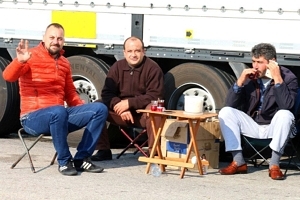
One of several impromptu tea parties during the 5-10 hour wait.
The wife turns out to be a lovely Greek woman in her early 40s, who met her husband in Athens four years ago. She is Orthodox Christian, while he is Muslim. Both hate Erdogan’s ‘Islamification’ of the country. ‘The Koran is very clear,’ he stresses. ‘It explicitly says you mustn’t force people to convert.’
Both are keen to visit the UK, but Turks find it hard to get foreign visas ‘because of the Kurds’. The low wages don’t help either: around ₺2,000 (£520) a month, on average. Their home is modest and beige, with laminate flooring and décor trimmed with traditional Turkish flourishes. I am put up in a cosy pull-down bed in the dining room and fall asleep in seconds.
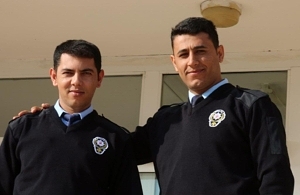
After much perplexed scratching of brows, the Kirklareli police finally agree to take me under their wing.
I leave the next morning for Kirklareli following a hearty breakfast of feta cheese, cold meats, tomatoes and boiled eggs. It’s an easy, uneventful ride, and I arrive at noon to find a fairly sizeable town with a few nice old bits scattered about. Tonight I am staying with a couple from Warmshowers (not as exciting as it sounds, sadly — just a cycling couch-surfer site), who transpire to be a young pottery student and hirsuit electrical engineer. Neither is Muslim, unlike 95% of the population.
‘Erdogan only favours the rich metropolitan elite,’ the hairy engineer tells me over some delicious, homemade vegan slop. He holds regular protests against development projects in rural areas, he says, and hopes soon to build an eco-farm. ‘Agriculture here is dying.’
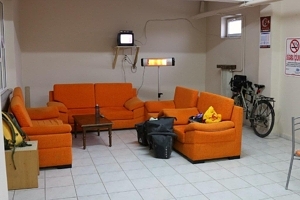
My digs in the police station basement: clean, comfy and upliftingly luminescent.
The next day, I set off for Vize. I am just 30km from my destination when I am accosted by a couple of friendly Antipodeans: a Kiwi lawyer and Aussie economist (known henceforth as the Ms). They are also headed for Istanbul and we decide to ride the rest of the way together. It feels comforting to have a little company for a change – if only due to the pocketfuls of enormous rocks they’ve accumulated to ward off our furry foes on the sidelines.
Vize is a semi-attractive, gently bustling town with a pleasant 6th century church-turned-mosque. After lunch, I leave the Ms to track down my host, another engineer and friend of the eco-warrior couple. We meet at his vast, empty, new-but-grimy flat, before he reads my mind and whisks me out for a kofte. While his English is poor, he goes out of his way to welcome me, and insists on paying for dinner. ‘My home, your home,’ he writes over Google Translate. ‘Stay longer?’
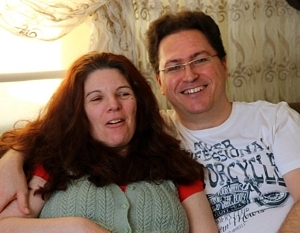
A lovely Turkish/Greek couple who rescue me from the police station after seeing me in town earlier in the day. He is Muslim, she is Orthodox Christian. ‘The Koran explicitly says you mustn’t force people to join Islam,’ he says.
I reconvene with the Ms the next morning for an 82km ride to the tiny town of Subasi, where there’s apparently a hotel. It’s so enjoyable cycling with them that I find myself wondering at what point it was that I became lonely. The Ms are not only brilliant fun, but native English speakers on the same cultural wavelength. My gravitation towards them is partly a mark of the old familial, tribal instincts within, I know; the ones that sow discord as much as encourage kinship. But it can’t be good for the soul to store up four months of bad puns and dirty jokes with no outlet.
We arrive at 2.30pm to disappointment all round. Subasi is a bit of a shithole, it turns out; the kind of place where dogs pee on old tyres and everyone is fixing a broken carburettor, yet nothing is ever fixed. A lone donkey chews the corner of a disembowelled dishwasher, while plastic bags waft forlornly in the air, buoyed by stale currents of gloom and decay.
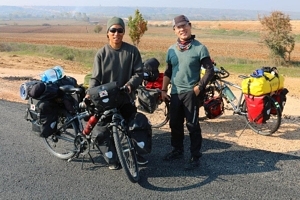
Korean father and son, who I meet near Kirklareli: the first fellow bummlers I’ve seen since Italy. They are cycling almost the whole world. Inspiring.
Yet somehow, the Turkish spirit still finds its way through. We devour a delicious beef stew with beans, cold chips and aubergine for just £4 a head – the price arbitrarily plucked out of the air at the end, as usual – before making our way to the local café, where we are given several rounds of free tea. By the time we’re handed complimentary cereal bars in the supermarket, I can already feel my defences softening.
We go searching for the hotel and are pleased and a little surprised to discover that it does actually exist. It is impressive in its way, perplexingly disproportionate to the small size of the town and with the faded grandeur of a D-list-celeb-turned-wino. Outside, the swimming pool is a deep pea green, bordered by the types of statues almost certain to come alive at night, while a cluster of mannequins in the foyer could easily be extras from Andy Warhol’s 1960s Blue Movie. The rooms themselves are spacious, with parquet floors and hunks of oak furniture, plus a few rogue pubes thrown in for free (it’s a night for sleeping bags, we decide).
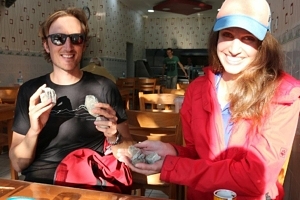
The wonderful Ms, who I meet en route to Vize. Their (highly effective) anti-hound strategy involves a fairly hefty supply of rocks.
The next morning, we set our sights on Istanbul. The six-lane D0070 is the lesser of the evils available to us, but turns out to be fairly evil nonetheless. For four hours we make our way along the hard shoulder, with regular roadworks nudging us sadistically into the path of monster, rattling trucks. By the time we finally hit the outskirts of the city, we’re thoroughly fed up and more than ready for the celebratory lamb doner we’ve been promising ourselves. Settling down at a restaurant, we tuck in with gusto. There’s just 7km left to Taksim Square from here, we rejoice. We’ve pretty much made it.
Or so we think. Little do we know that between us and Taksim lies a torrid, labyrinthine mass of urban barbarity designed to vanquish even the hardiest of bummlers. Ten-lane highways, unhinged motorists, vertical hills, inconvenient cats and tunnels of death all conspire to finish us off, swiftly and unceremoniously. Imagine Hunger Games meets Takeshi’s Castle meets Theseus and the Minotaur, but with bikes. That’s a wildly exaggerated scenario of what it’s actually like, but imagine it all the same.
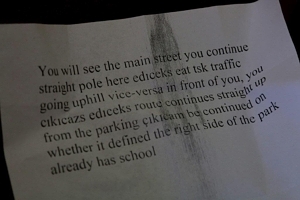
Helpful instructions printed by a hotel to help me find my host’s house in Vize.
Three hours later, we finally make it to the flat of Ms’ friend in the bohemian grunge-chic neighbourhood of Beyoğlu. We shut the doors, hit the bottle and vow never to cycle anywhere near Istanbul ever again.
The next day, after a long and glorious sleep, I’ve recovered sufficiently to make my way to Sisli in north Istanbul to meet my next Warmshowers host, leaving Maud under the safe guardianship of the Ms. En route, I take my milk-doused laptop to Lenovo (an official sponsor) to see if they can fix it. Sadly nothing is salvageable, but they replace the hard disk, motherboard and keyboard immediately, all free of charge. What legends.
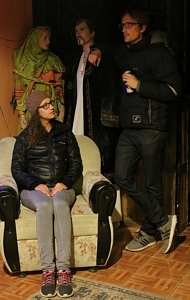
1960s Warhol-esque porn-star mannequins in the Subasi hotel, and their real-life doppelgangers.
My host, S, turns out to be a 30-year-old banker who advises insurance companies and lives in a large, cosy flat with a friend. He has a 26-year-old girlfriend, but ‘isn’t yet ready to marry yet’, though it’s normal here to be hitched by your mid-20s, apparently. Both he and his girlfriend are atheists, and deeply critical of their president.
‘The government is very corrupt and geared only towards the rich,’ he says. ‘But the poorer, uneducated people vote for him as he gives them bribes and coal before elections, and they think he’s defending Islam.’
S tells me the story of a tape recording in February 2014 that caught Erdogan — or an impersonator — instructing his son to dispose of millions of dollars from their home in the midst of a huge corruption investigation. The president claimed the tape was a fabrication, and many believed him. I later look up Turkey’s rankings on the Corruption Perceptions Index table and see it sits at 66 out of 168 countries. It fares worse on the World Press Freedom Index, at 151 out of 180. That’s lower than Pakistan, South Sudan and Russia.
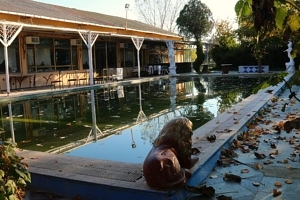
Who’s for a dip? The deliciously emerald pool at the Subasi hotel.
Was S at the Gezi Park protests in June 2013, I ask? Yes, he tells me. ‘There was an amazing atmosphere. Real hope and excitement. But the government was clever. They did nothing for two weeks until everyone got bored. Then they cleared everyone at 5am, shut down social media, closed the metro and the roads. They arrested thousands. They killed and beat people. They spread false information that people were smoking and drinking in mosques. And that was it.’
In more uplifting news, my host tells me he eats at least two kebabs a week, and his flatmate eats about five. It sounds almost too good to be true. I’d always secretly feared the Turkish kebab obsession might be some outmoded custom or puffed up propaganda to entice the tourists, like dancing Masai warriors or Cairene papyrus painting. But when I tell him the lamb doner is not acceptable fodder in the UK unless you’re too drunk to remember having eaten it, he looks confused and a little crestfallen. ‘Maybe I won’t try to get a visa there after all,’ he says.
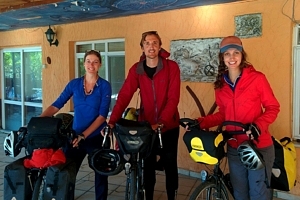
Fresh-faced and jolly before our final push to Istanbul. Little do we know what’s in store…
I spend the next few days meeting people and exploring the city’s enchanting jumble of roaming passageways and plazas. I won’t go into all the stunningly beautiful architecture to be seen in Istanbul – the Süleymaniye Mosque, the Blue Mosque, the Grand Bazaar, the Topkapi Palace, the Hagia Sophia etc. – as this is all old hat. But the city as a whole I find captivating. Historical yet cosmopolitan, Asian yet European, reassuringly ‘Turkish’ yet exquisitely diverse, it feels unlike anywhere I have been before. As Constantinople, it was the capital of both the Catholic Roman Empire (from 330AD) and Islamic Ottoman Empire (from 1453), and a palpable aura of its former religious and socio-political stature seems to linger even now.
The first friend I meet is B, a septuagenarian South African who has lived here for 16 years. ‘Erdogan is mad, but there’s simply no alternative right now,’ he asserts over a lunchtime kofte. ‘After the Gezi riots, he got paranoid about a coup, detained half the army without trial and trained up hundreds of loyal, uneducated youths as his personal police force.’
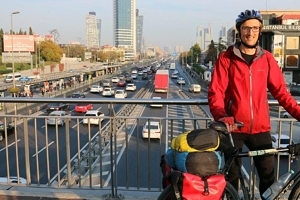
After a four-hour, 75km journey, we proceed to spend the next three hours dragging our bikes across multiple ten-lane highways to the city centre. Not to mention the vertical hills and occasional tunnel of death. Never again.
Another friend, a Turkish lawyer-turned-freelance-yoga-teacher, says Erdogan was ‘originally a decent guy’. ‘He supported the poor against the moneyed elite and tried to talk to the Kurds,’ she tells me. ‘But then he got drunk on power.’
My friend advises me to ‘watch out for the men’ in Turkey, and recounts the story of an artist who was raped and killed in 2008 while hitchhiking. It’s a sobering tale and I reflect on it at length afterwards. This happened eight years ago, I ponder, and was a one-off event; should it really have a bearing on my journey now? What are the mathematical probabilities of it happening to me? One in a million? A billion? Ten billion?
And there’s the rub. Crimes like this are tragic, and they are what people remember when they hear of lone female travellers to Turkey, or Bulgaria, or anywhere outside the glossy brochure supplements. They are what people base their opinions on, and their fears. But they are not the norm. They are the exception. In my mind, the media is too often a distorting lens, selecting the worst and making it the whole. So much colour can be missed by focusing solely on the shadows.
Read about my journey on Twitter at reo_lowe or Facebook at bexbicyclediaries.
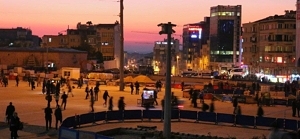
Taksim Square, finally. Just three hours later than planned.


Wendy Feltham
Posted at 15:55h, 22 SeptemberYour travels and insights are fantastic! I always love reading about your encounters with interesting people, and the kindness you find wherever you go.
reol8
Posted at 13:59h, 03 OctoberThanks so much for your comment, Wendy. The can never quite believe the level of kindness either – especially when combined with kebabs!
All best,
Rx
Dick Joyce
Posted at 16:48h, 23 SeptemberSuperb as usual. I love your spot-on comments towards the end about the ‘media’. You’re absolutely right in my opinion: they turn rare into everyday, and distort reality. Tele must be one of the most socially destructive inventions of all time; the living proof of that is me, who is addicted to it.
reol8
Posted at 14:14h, 03 OctoberThanks, Dick. Are you saying TV has destroyed you or made you socially destructive? Or both? 🙂
Katalin Lowe
Posted at 11:02h, 30 SeptemberExcellent blog, I loved reading it. It achieved the well-nigh impossible: made me feel benevolent, almost affectionate, towards the Turks. As you may know, this doesn’t come easy to a Hungarian – we are still resenting the hordes of Suleiman the Magnificent that devastated our country in the 16th Century. However, Ataturk has always been one of my heroes, so I have had these mixed feelings towards them. But they were lovely to you and that’s all that matters. And the food there is superb, we had some marvellous meals in Istanbul. But don’t cycle there ever again, or I’ll kill you!
reol8
Posted at 14:24h, 03 OctoberYes, I guess S the M would leave a bit of a bad taste. He did have a formidable turban, though. Couldn’t believe how much Ataturk love there still is, though – despite the current ravaging of his legacy. He’s literally everywhere. What a geezer.
xxx
rajasthan travels from delhi
Posted at 10:45h, 30 NovemberThank you for this post man. its very informative.
EDV-Berater
Posted at 12:50h, 04 NovemberReally great web-page. You have seen a lot of places. https:\\streimelweger.de